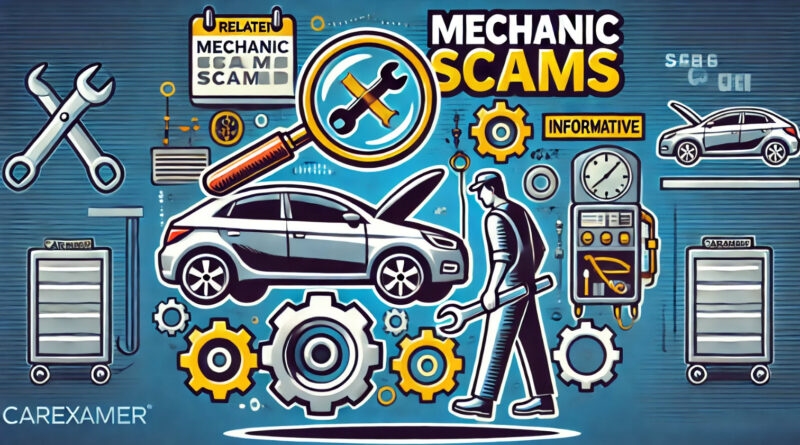Mechanic Scams Revealed How to Protect Yourself and Your Vehicle
In this article, we’ll reveal some of the most common mechanic scams, how to spot them, and what you can do to protect yourself. When it comes to car repairs, most of us rely on the expertise of mechanics to keep our vehicles running smoothly. Unfortunately, not all mechanics are trustworthy, and some may take advantage of unsuspecting customers. Mechanic scams are more common than you might think, and they can lead to unnecessary repairs, inflated bills, or even safety issues.
Common Mechanic Scams
- Unnecessary Repairs
- How it Works: A mechanic may tell you that your car needs repairs that aren’t actually necessary. They might claim that parts are worn out or that certain systems are failing, even when they are in good condition.
- How to Avoid: Always ask for a detailed explanation of why a repair is needed and request to see the damaged parts. If you’re unsure, get a second opinion from another mechanic before agreeing to any major repairs.
- Overcharging for Parts and Labor
- How it Works: Some mechanics inflate the prices of parts or charge for more hours of labor than were actually needed. This can significantly increase your repair bill.
- How to Avoid: Research the average cost of parts and labor for your specific repair online. Request a written estimate before any work begins and compare it with quotes from other shops.
- The “Engine Flush” Scam
- How it Works: Mechanics may recommend an engine flush, claiming it’s necessary to remove sludge and improve performance. In reality, most modern engines don’t require this service, and it can even cause damage if done improperly.
- How to Avoid: Check your vehicle’s owner manual to see if an engine flush is recommended. If it’s not mentioned, chances are you don’t need it.
- The Phantom Repair
- How it Works: In this scam, a mechanic charges you for a repair that was never actually performed. They may list parts that were never replaced or services that were never completed on your bill.
- How to Avoid: Ask for the old parts back after they’ve been replaced. This can confirm that the work was actually done. Additionally, request a detailed invoice that lists all parts and labor.
- Switching Out Parts
- How it Works: A dishonest mechanic might replace a good part in your car with an inferior or used part, then sell your good part to someone else.
- How to Avoid: Mark your parts with a discreet identifier before taking your car to the mechanic. This way, you can check if the same parts are still in your vehicle after repairs.
- The “Urgent” Repair Scam
- How it Works: The mechanic claims that a problem needs to be fixed immediately, creating a sense of urgency. They might exaggerate the severity of an issue or invent one altogether to pressure you into paying for unnecessary repairs.
- How to Avoid: Don’t make hasty decisions. Take your car to another mechanic for a second opinion, especially if the repair is expensive or seems suspicious.
- Inflated Diagnostic Fees
- How it Works: Some shops charge exorbitant fees for diagnostic tests that should be relatively inexpensive or even free. They might charge you for a full hour of labor for a test that takes only a few minutes. Sometime it’s not a scam but some specialists know faults quick as they have fixed the 1000 times over and over. Fair play as it’s quick money for professional.
- How to Avoid: Ask about diagnostic fees upfront and compare them with other local shops. Some places offer free diagnostics as part of their service.
How to Protect Yourself from Mechanic Scams. Also remember to check garage reputation as everyone charges based on their reputation. It’s free market you can charge anything you like for your service. You always have choice where to shop Harods or Primark.
- Do Your Research
- Before taking your car to a new mechanic, research the shop online. Look for reviews and ratings on websites like Google, Yelp, and the Better Business Bureau. Avoid shops with a pattern of negative reviews or complaints.
- Get Everything in Writing
- Always request a written estimate before any work begins. The estimate should include a breakdown of parts, labor, and any additional fees. Once the work is done, compare the final bill with the estimate to ensure everything matches.
- Know Your Car
- Familiarize yourself with the basics of your vehicle’s systems and maintenance needs. This knowledge will make it harder for a mechanic to trick you into unnecessary repairs.
- Ask Questions
- Don’t be afraid to ask detailed questions about the repairs your car needs. A trustworthy mechanic will be happy to explain the issues and walk you through the repair process.
- Get a Second Opinion
- If a mechanic recommends a major repair, consider getting a second opinion from another shop. This can confirm whether the repair is truly necessary or if you’re being scammed.
- Build a Relationship with a Trusted Mechanic
- Find a reliable mechanic through recommendations from friends, family, or online reviews. Building a relationship with a trustworthy mechanic can help ensure you get honest service.
Mechanic scams can be costly and stressful, but by staying informed and vigilant, you can protect yourself and your vehicle. Always approach car repairs with a healthy dose of skepticism, and don’t hesitate to seek a second opinion if something doesn’t seem right. By following these tips, you can avoid falling victim to mechanic scams and ensure that your car gets the honest service it deserves.
Buying a used VW. Buying used vauxhall, BMW, Jaguar, Ford, Volvo, Range rover, Bentley, Aston Martin, Porsche, Ferrari, Lamborghini, Maserati, Hyundai, Tesla, Honda, Pagani

